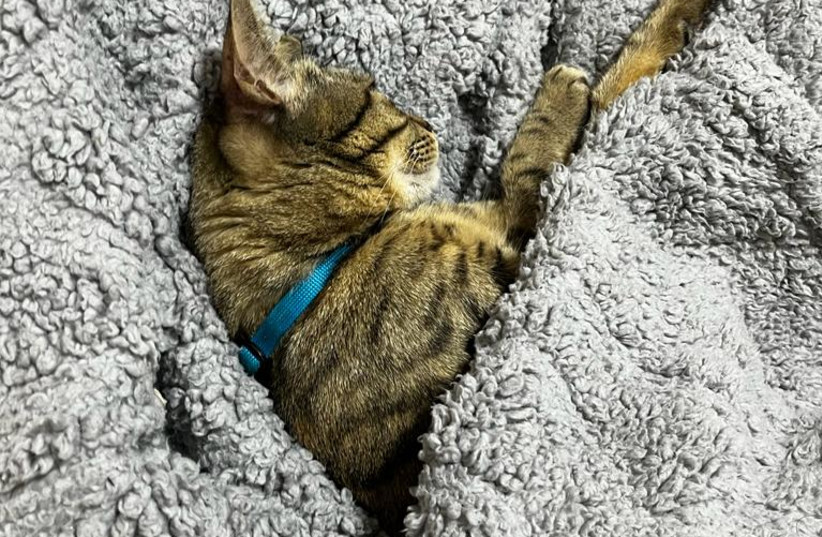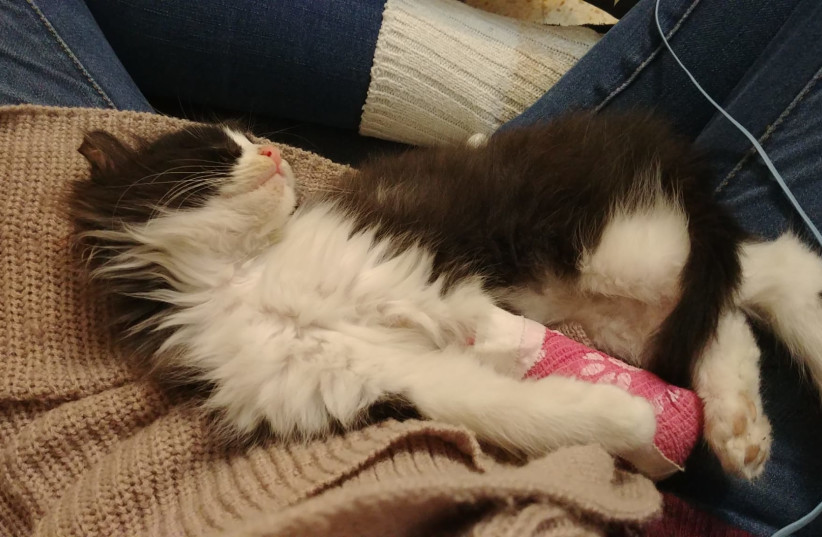August 8, 2023 marks the 21st annual International Cat Day, a yearly celebration of everyone's favorite - and oft aloof and quirky - feline friends. But despite how popular cats are, not everyone knows the best ways to adopt them.
Unlike humanity's other domesticated pet of choice, the humble dog, the not-so-humble cat is known for a distinct predilection for independence and ingratitude. As such, it can be hard to tell if you're doing what's best for your cat - especially when it comes to adopting one.
So what do you do if you want to adopt a cat? A question that is especially relevant in Israel, where the street cat population is so large that it essentially is the Jewish state's largest minority demographic.
In honor of International Cat Day, The Jerusalem Post spoke with Dr. Orly Zakay, an expert working with the Israeli pet food and accessory firm Biopet, about what you need to know about adopting a new purr-fect addition to your family.
What is the best age for a cat to be adopted?
There is no shortage of young kittens living on the streets, and adoption shelters are rife with cats of all ages.

However, as cute as kittens may be, adopting them when they're just a few weeks old isn't the best idea.
"Kittens, as well as many other mammals, need close care from their mother in the first weeks of their lives," Zakay explained. "When cats stay with their mother at home, they learn how to play, identify food, hunt, and communicate with other cats. For example, a mother cat teaches the kittens the difference between a gentle and a strong bite. They also learn how to hunt, clean themselves, and use their claws."
Generally speaking, you shouldn't adopt a cat before it's eight weeks old at minimum. Up until then, cats are exclusively breastfed by their mothers to develop the right antibodies they need. Further, staying with their mothers for this long can help them be friendlier with other cats.
Sadly, there are many kittens who are younger than eight weeks old and need homes due to circumstances. If you do decide to adopt such a small cat, remember it needs help to learn and will require a lot of love and patience.
What's the first step towards adopting a cat?
Regardless of whether you get your new cat from a shelter or the metaphorical universal cat distribution system ends up having you find a stray cat, the first thing you need to do is visit a veterinarian.
It's important to check if the cat is healthy, what vaccines it might need, if it needs to be spayed or neutered, etc. This can also vary depending on how old the cat is.
The next thing you need to know is if you live in a suitable place for a cat. This can be especially important depending on the cat's age and how it was living before. For example, a very high-energy cat or an older cat used to living on the streets might find a sudden shift to a small apartment very jarring, and the transition might be very stressful. This can result in restless behavior and a lot of late-night meowing.

What other pets can you have with a cat?
So you have an apartment suited for a cat and the vet has given your new furry friend a clean bill of health. But have you considered how your cat will be with your other pets?
Cats can be territorial and can sometimes be hostile to new arrivals. As such, it's important to take the right steps depending on the pet.
For example, getting a dog or another cat is usually fine, but it requires a healthy process of socialization. You need to find ways to slowly introduce them to one another in a healthy manner to help them coexist. With luck, you may now end up with pets who are also each other's best friends.
But say you have a smaller animal like a rabbit or hamster. This can also be fine with the right socialization and preparation, but considering cats are natural hunters and exclusively carnivorous, they may see rabbits or hamsters as food, rather than friends.
What sort of things should new cat owners watch out for?
Zakay provided a list of five main tips that new cat owners should do to make their home fit for a kit.
- Make sure your cat has all the necessary medicine it will need after a visit to the vet.
- Make sure to have high-quality healthy and delicious food for your cat to enjoy. Be sure to include some canned wet food or meat in its diet to add some variety and excitement.
- Have two water bowls in your home and refill them with fresh water every day. Keep in mind though that some cats prefer to drink running water, so consider investing in a little cat water fountain. This is important since cats tend to drink less water than they should.
- Have a screened window available that lets your cat look outside. This lets them feel less isolated from the outside world.
- Buy some plants that cats like, such as wheat grass, lemon grass, and peppermint. Use this to make a mini garden to make cats feel more at home.
Should you have an indoor or outdoor cat?
This is one of the most controversial topics among cat owners, and both sides have their points.
Cats, for example, are natural predators. They love being outside and the independence that provides, letting them explore the world around them, play, and hunt. However, the outside world can be dangerous. They can get in fights with dogs, snakes, or other cats; they can get hurt by cars; they can come back with fleas; and they are known to harm local wildlife by praying on birds and other animals.
For these latter reasons, many experts have cautioned against letting your cat go outside. Zakay, however, disagrees.
"Even a cat that lives inside an apartment has a strong instinct to hunt that must be satisfied."
Dr. Orly Zakay
"I am in favor of taking your cat outside as much as possible, or lettting them choose to go out and come back in when they want," she explained. "A cat is a predator. The instinct to hunt is a basic instinct that can't go away. Even a cat that lives inside an apartment has a strong instinct to hunt that must be satisfied."
If you have a cat that doesn't go outside, you'll need to find some way to meet its urges to hunt, such as providing plenty of interesting and challenging playtime activities to get it to expend all of its energy.
And if you think about getting a now-adult cat to suddenly stop going outside, this change might not go over well with them. They will start showing more aggression towards their humans and other pets, and may also start "incessant meowing."
"Outside there are dangers such as cars, diseases, injuries, and more, but at the same time in my opinion, the cat's mental health is just as important," Zakay said.
She recommended living in a relatively quiet area or with a fenced-off yard and maybe even a cat door for your feline friend to go in and out at their leisure.
But you should always check your environment before making this decision. If you do decide to let your cat go outside, do so responsibly and safely.
